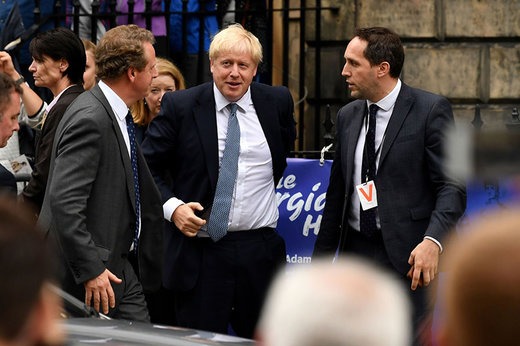After four consecutive victories in parliamentary election, Scottish National Party has promised to hold the second plebiscite on independence, which can lead to a confrontation with Boris Johnson and a serious problem for British Prime Minister.
Different Reactions of the British Government on the plea for holding a plebiscite of independence in Scotland
At the outset, Boris Johnson will undoubtedly resist, arguing that holding a plebiscite during Corona pandemic will be an unreasonable measure. This can buy some time for London in short term. Nicola Sturgeon, the first minister of Scotland and the leader of Scottish National Party has also announced that she will not be seeking for holding a plebiscite until the end of Corona crisis. In view of a new plebiscite needs the seal of endorsement from the British Parliament, Johnson will resist against the demand under the pretext that Scottish nationalists have accepted that plebiscite will be held only once (55% of the voters in 2014 voted for remaining in Britain). London will also use the budget factor to solve the Scottish problems and will spend billions of pounds within the framework of “Domestic Market Act” for road and rail-road constructions as well as other infra-structure projects. Scottish Hospitals will also be able to send more patients to Britain for their treatment.
Another measure taken by Johnson administration is to set a new date for election. Hoping that the National Scottish Party may lose its seats, the election may take place in 2023 instead of 2024. Thus, the demand for holding a new plebiscite postpones. However, many believe that such a measure may bring adverse result, and Sturgeon may even use it for strengthening of nationalism and anti-Westminster approach. Hence, wins more support for independence. Another option is to grant more authorities to Holyrood, the Scottish Parliament. If this happens, there is a risk for Johnson to see more demands as he gives more concessions.
In case London rejects to hold new plebiscite, Sturgeon may see more pressure for new authorization to this end. British parliament may refer to the court and argues that the initiative of Scottish parliament is against the Constitution. Because taking measure to hold plebiscite must be approved in London. Another possibility is to settle the case in the Supreme Court at the final stage. Even if this happens, the issue of holding a plebiscite will only be postponed. As mentioned earlier, the Supreme Court may substantiate the Scotland Act and declares that the decision making on the union between Scotland and England has been referred to the Westminster.
Holding a plebiscite without the consent of British Parliament may hamper Sturgeon’s credibility especially in the EU. She can hold a consultative plebiscite to exert a kind of pressure on the Westminster to agree. This is a less challenging approach and can be the acid test to assess the public opinion in Scotland. In this case, it will be challenging for London because the Scottish problem will not be wiped out. London should answer this question that if the Scotts’ will is to become independent from Britain, what is the legal procedure to attain independence? However, Sturgeon may have to pay a high price to be independent from Britain. According to “Governance Institute” it takes ten years for Scotland to become independent from Britain and to join the EU. Border-line between Scotland and England may bring negative consequences for Scotland. However, border-line is not the only problem for Scotland. The Country will have to create (necessary) infra-structures for a new State. For example, it should become a member of the World Trade Organization (WTO) prior to entering into any negotiation with the EU.
Way Ahead
Boris Johnson has sent a letter to Sturgeon in which he has invited her to talk about the joint challenges. He said in his letter that the interests of people can be secured through cooperation. In an article written by Johnson before the Scottish election in Daily Telegraph, any effort to dismember the country is an irresponsible act. However, Sturgeon has said Scottish voters have given a clear agenda to Holyrood. Therefore, there is no democratic justification for Johnson or anybody else to hinder the Scotts from the restoration of their rights. In the meantime, she has said that her top priority is to immunize her people against Coronavirus, and she plans to hold plebiscite immediately after the end of Coronavirus and the Scotts have the right to determine their future. She has also said that holding the plebiscite will not be an act of arbitrary, because the world community, as well as the British government, will not recognize it. Opinion polls suggest that the number of supporters and opponents of independence from the UK is equal. The factors to win the support of Scotts on the second plebiscite are as follows:
The majority of Scotts opposed the Brexit,
Sturgeon government managed the Corona properly,
Scott’s view on Johnson administration
To conclude, it can be said that if there is a coalition between the National Scottish Party and the Greens, they can win 72 seats out of 129 in British parliament and thus more pressure can be exerted on the Johnson administration to agree with the second plebiscite. In this case, both the Scottish government and Parliament will support the idea of independence from Britain. Present political deadlock may continue until the next nationwide election unless there is a change in public opinion and the balance between Brexit supporters and opponents.










0 Comments